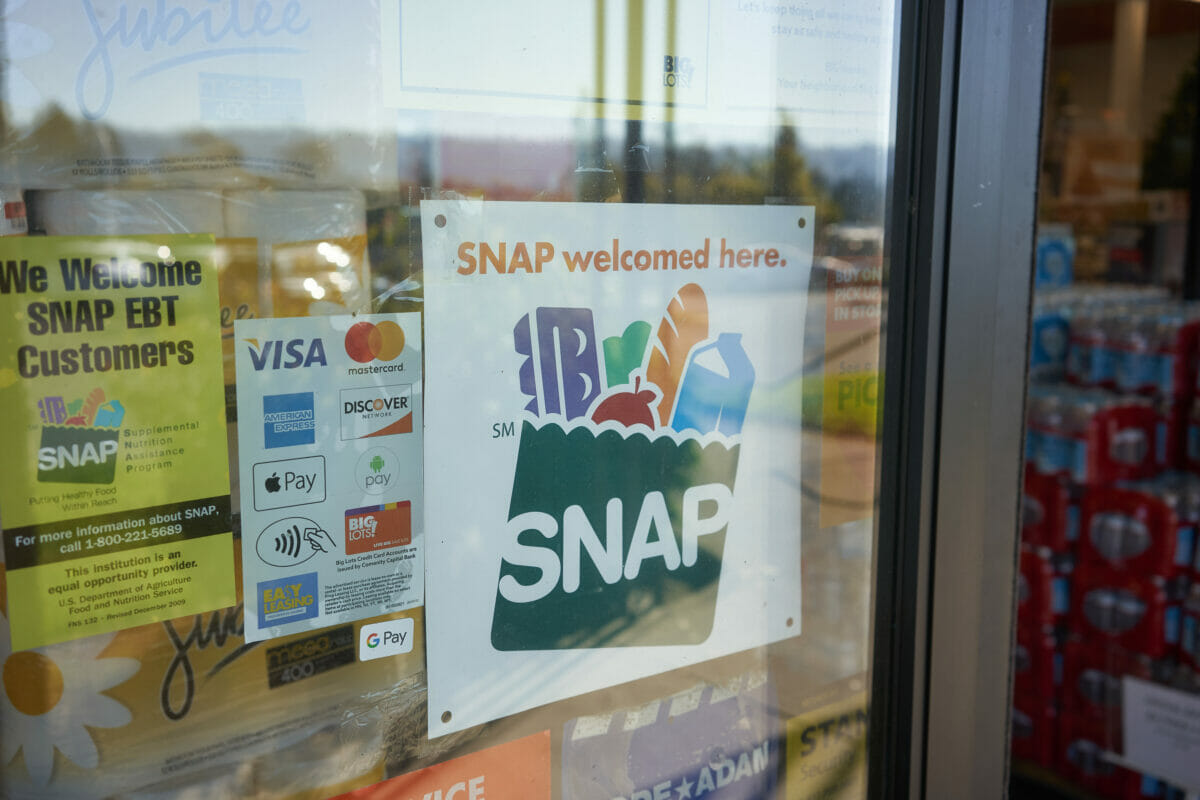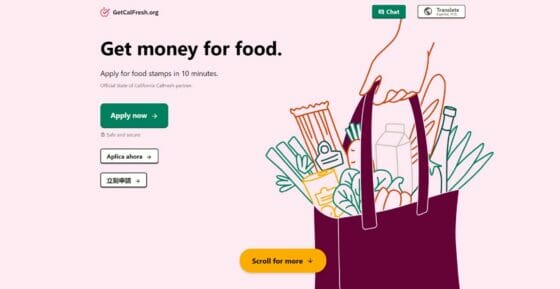Making SNAP Recruitment More Equitable Across Language Barriers
Speaking English as a second language can make applying for government benefits difficult. Inequitable ad recruitment can deepen the divide.
Making SNAP Recruitment More Equitable Across Language Barriers
Speaking English as a second language can make applying for government benefits difficult. Inequitable ad recruitment can deepen the divide.

SNAP benefits can be used to procure food and improve food security. by Shutterstock
Perched on top of a narrow hilltop ridge in Seattle, Washington’s Beacon Hill neighborhood, El Centro de la Raza serves as a voice and resource hub for the city’s Latino/a community. The nonprofit organization’s bilingual System Navigation Team, led by Daniela Lizarraga, helps connect community members with government benefits such as SNAP (Supplemental Nutrition Assistance Program), assisting 10 or more non-English speakers per month with SNAP applications.
SNAP is a government program that offers financial assistance to qualifying individuals to help with food costs. Research has shown that SNAP significantly helps address food insufficiency. But the applications can be difficult to complete for non-English speakers, so El Centro de la Raza’s navigation assistance is critical.
In one case, the team helped a family where the mother was experiencing homelessness and staying at a women’s shelter downtown. El Centro de la Raza staff found that the family was eligible for assistance, because the mother’s two youngest children had been born in the US. The team helped her navigate the application, and she was approved for SNAP benefits for her family.
“This has helped greatly as she was concerned for their health,” wrote the System Navigation Team in an email. “Most of the food provided by the shelter and food bank is processed food and her family was suffering from stomach issues from this.”
Even if the applications are available in Spanish, they can contain confusing legalese that doesn’t translate well. Some people don’t apply for SNAP because they are not American citizens and are worried that receiving benefits will have negative consequences for their immigration status. (It does not. You do not have to be a US citizen to qualify for SNAP, but there are other requirements.) For any non-English speaking individual, accessing benefits can be difficult, even if they qualify. As a result of these obstacles, some people who qualify for these critical benefits do not apply for them.
Researchers at Cornell University have highlighted an additional obstacle for Spanish speakers in applying for SNAP. New research found that Google ads that recruit Californians to sign up for SNAP may have been disproportionately favoring English speakers over Spanish speakers.
SNAP ads
Californians may apply for SNAP through GetCalFresh, a website created by the nonprofit group Code for America. Researchers observed that, based on income data, fewer Spanish speakers were applying for SNAP than expected. For example, of all the adults in San Diego County who live below the federal poverty line, 23 percent of them speak Spanish primarily. But only seven percent of ad-converted SNAP applicants were Spanish speakers. Even though the qualifications for SNAP are more complex, income level is a decent proxy for estimating the number of eligible individuals. Code for America and researchers at Cornell, led by assistant professor of information science Allison Koenecke, decided to investigate.

They found that it costs nearly four times as much to convert Spanish speakers into SNAP applicants through Google ads than it does for English speakers, although Koenecke and her team can’t say exactly why.
“There are a lot of moving parts in a lot of these different online ad algorithms, including Google’s, which, of course, for any of these sorts of commercial services, the underlying algorithms are black boxes,” says Koenecke. “We don’t have any internal data access.”
Still, they can make an informed hypothesis that the higher cost to convert Spanish speakers is resulting in a lower-than-expected number of Spanish-speaking applicants. The algorithm tries to be as efficient as possible and will therefore try to convert as many new people for the lowest amount of money. As a result, Spanish speakers could be targeted less.
Although an efficient algorithm makes sense mathematically, it’s not very equitable in real life.
“Overall, I’d say the most efficient method is not always the one that makes the most sense to implement in the wild,” says Koenecke.
Beyond advertising
The Navigation Team at El Centro de la Raza wrote to Modern Farmer to say there are enough organizations to help people apply for SNAP, but there are gaps in the information available.
“There is not enough information as to who is eligible; also there should be more resources geared to minimize the fear that these families have about how this could affect their immigration status. There should be more helpful resources explaining the process and documents required.”
In a 2021 report by Massachusetts anti-hunger organization Project Bread, the City of Boston’s Office of Food Access and UMass Boston’s Center for Survey Research, 30.4 percent of Latino respondents and 38.4 percent of Asian respondents reported they were concerned that applying for SNAP would affect their immigration status.
“SNAP does not impact immigration status! You can apply for benefits without worrying about impacting your or a loved one’s immigration status,” wrote Erin McAleer, president and chief executive officer of Project Bread, in an email.
El Centro de la Raza’s staff includes individuals who speak English, Spanish, Mandarin and Cantonese. Project Bread’s awareness campaign targets several different languages, but McAleer says there could always be more.
“There are many more languages and many more people who don’t fit into the seven official languages with which our campaign is operating. To reach all Massachusetts residents, and people nationwide, further outreach, support and understanding will always be required.”

Real-world impact
Koenecke and her team also administered a survey to 1,500 Americans from diverse backgrounds. They found that, in general, the consensus was that the survey recipients would prefer an equitable approach to SNAP recruiting over the most efficient one. This study and survey can result in a tangible difference in overcoming barriers to food assistance.
“This sort of finding is specifically one that can help local programs, things like GetCalFresh, actually make these sorts of decisions on how to allocate their funds,” says Koenecke. And that’s what happened in this case—Code for America made the decision to begin advertising more intentionally to Spanish speakers as a result of these findings.
Koenecke says it feels good to do research that has a real-world impact. “This work is very much inspired by the hope that folks who need food assistance are able to get the help that they need through SNAP,” she says. “Hopefully, this research will help make sure that the process to get that food assistance is straightforward and doesn’t unnecessarily burden these folks.”
Follow us
This work is licensed under a Creative Commons Attribution-NoDerivatives 4.0 International License.
Want to republish a Modern Farmer story?
We are happy for Modern Farmer stories to be shared, and encourage you to republish our articles for your audience. When doing so, we ask that you follow these guidelines:
Please credit us and our writers
For the author byline, please use “Author Name, Modern Farmer.” At the top of our stories, if on the web, please include this text and link: “This story was originally published by Modern Farmer.”
Please make sure to include a link back to either our home page or the article URL.
At the bottom of the story, please include the following text:
“Modern Farmer is a nonprofit initiative dedicated to raising awareness and catalyzing action at the intersection of food, agriculture, and society. Read more at <link>Modern Farmer</link>.”
Use our widget
We’d like to be able to track our stories, so we ask that if you republish our content, you do so using our widget (located on the left hand side of the article). The HTML code has a built-in tracker that tells us the data and domain where the story was published, as well as view counts.
Check the image requirements
It’s your responsibility to confirm you're licensed to republish images in our articles. Some images, such as those from commercial providers, don't allow their images to be republished without permission or payment. Copyright terms are generally listed in the image caption and attribution. You are welcome to omit our images or substitute with your own. Charts and interactive graphics follow the same rules.
Don’t change too much. Or, ask us first.
Articles must be republished in their entirety. It’s okay to change references to time (“today” to “yesterday”) or location (“Iowa City, IA” to “here”). But please keep everything else the same.
If you feel strongly that a more material edit needs to be made, get in touch with us at [email protected]. We’re happy to discuss it with the original author, but we must have prior approval for changes before publication.
Special cases
Extracts. You may run the first few lines or paragraphs of the article and then say: “Read the full article at Modern Farmer” with a link back to the original article.
Quotes. You may quote authors provided you include a link back to the article URL.
Translations. These require writer approval. To inquire about translation of a Modern Farmer article, contact us at [email protected]
Signed consent / copyright release forms. These are not required, provided you are following these guidelines.
Print. Articles can be republished in print under these same rules, with the exception that you do not need to include the links.
Tag us
When sharing the story on social media, please tag us using the following: - Twitter (@ModFarm) - Facebook (@ModernFarmerMedia) - Instagram (@modfarm)
Use our content respectfully
Modern Farmer is a nonprofit and as such we share our content for free and in good faith in order to reach new audiences. Respectfully,
No selling ads against our stories. It’s okay to put our stories on pages with ads.
Don’t republish our material wholesale, or automatically; you need to select stories to be republished individually.
You have no rights to sell, license, syndicate, or otherwise represent yourself as the authorized owner of our material to any third parties. This means that you cannot actively publish or submit our work for syndication to third party platforms or apps like Apple News or Google News. We understand that publishers cannot fully control when certain third parties automatically summarize or crawl content from publishers’ own sites.
Keep in touch
We want to hear from you if you love Modern Farmer content, have a collaboration idea, or anything else to share. As a nonprofit outlet, we work in service of our community and are always open to comments, feedback, and ideas. Contact us at [email protected].by Lena Beck, Modern Farmer
September 27, 2023
Modern Farmer Weekly
Solutions Hub
Innovations, ideas and inspiration. Actionable solutions for a resilient food system.
ExploreExplore other topics
Share With Us
We want to hear from Modern Farmer readers who have thoughtful commentary, actionable solutions, or helpful ideas to share.
SubmitNecessary cookies are absolutely essential for the website to function properly. This category only includes cookies that ensures basic functionalities and security features of the website. These cookies do not store any personal information.
Any cookies that may not be particularly necessary for the website to function and are used specifically to collect user personal data via analytics, ads, other embedded contents are termed as non-necessary cookies.
Quick and easy solution: learn English. I lived in Asia for years. Guess what? I learned their language. If you are coming to live here, learn English. Face it, go to other countries, their government doesn’t bend over backwards to provide services in English. We shouldn’t do so, either.
Agree with Needleman. Such study is wasting money. Food stamps is for Americans or those who intend to be citizens!
US immigration service requires its citizenship applicants to pass an English proficiency test. If an immigrant cannot support him/herself here due to his/her language inefficiency (including food stamp application), it shouldn’t attract an American academia to solve the human disparity. If tomorrow’s sizable group of non-English-speakers happen to come from some African or Arab tribes, would a Cornell professor lead a team of scholars to learn their rare languages, then lip-service our AI to equalize machine language function in order to reach “equality”? In fact, such study is a fake, simply because all the national leaders forever enjoy their personal cooks, and… Read more »